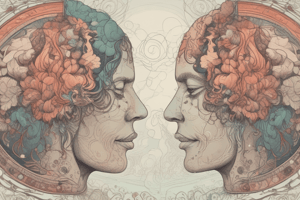Podcast
Questions and Answers
In psychology, what does theory of mind refer to?
In psychology, what does theory of mind refer to?
The capacity to understand other people by ascribing mental states to them.
What does a theory of mind include?
What does a theory of mind include?
The knowledge that others' beliefs, desires, intentions, emotions, and thoughts may be different from one's own.
Why is possessing a functional theory of mind considered crucial?
Why is possessing a functional theory of mind considered crucial?
For success in everyday human social interactions.
What factors can affect a person's capacity to display theory of mind?
What factors can affect a person's capacity to display theory of mind?
What is theory of mind similar to, but not identical with?
What is theory of mind similar to, but not identical with?
Flashcards
Theory of Mind
Theory of Mind
The ability to understand others by attributing mental states to them.
What Theory of Mind Includes
What Theory of Mind Includes
Understanding that others' beliefs, desires, intentions, emotions, and thoughts may differ from your own.
Why Theory of Mind is Important
Why Theory of Mind is Important
It enables successful interactions in everyday social contexts.
What affects capacity for Theory of Mind?
What affects capacity for Theory of Mind?
Signup and view all the flashcards
Theory of Mind vs. Empathy
Theory of Mind vs. Empathy
Signup and view all the flashcards
Study Notes
Theory of Mind
- Refers to the ability to understand and attribute mental states, such as beliefs, desires, and intentions, to oneself and others.
Components of Theory of Mind
- Includes understanding of:
- False beliefs: recognizing that others can have beliefs that are different from one's own.
- Mental states: recognizing that others have thoughts, feelings, and desires.
- Intentional behavior: recognizing that others' behavior is intentional and goal-directed.
Importance of Theory of Mind
- Possessing a functional theory of mind is crucial for:
- Social understanding and communication.
- Understanding others' perspectives and behaviors.
- Developing empathy and cooperation.
Factors Affecting Theory of Mind
- Capacity to display theory of mind can be affected by:
- Age: typically develops in children between 3-5 years old.
- Neurological or developmental disorders: such as autism spectrum disorder.
- Cultural and social environments: shaping understanding of mental states and behaviors.
Similar Concepts
- Theory of mind is similar to, but not identical with:
- Empathy: feeling and sharing others' emotions.
- Perspective-taking: imagining oneself in another's situation.
- Social cognition: understanding social information and behaviors.
Studying That Suits You
Use AI to generate personalized quizzes and flashcards to suit your learning preferences.




